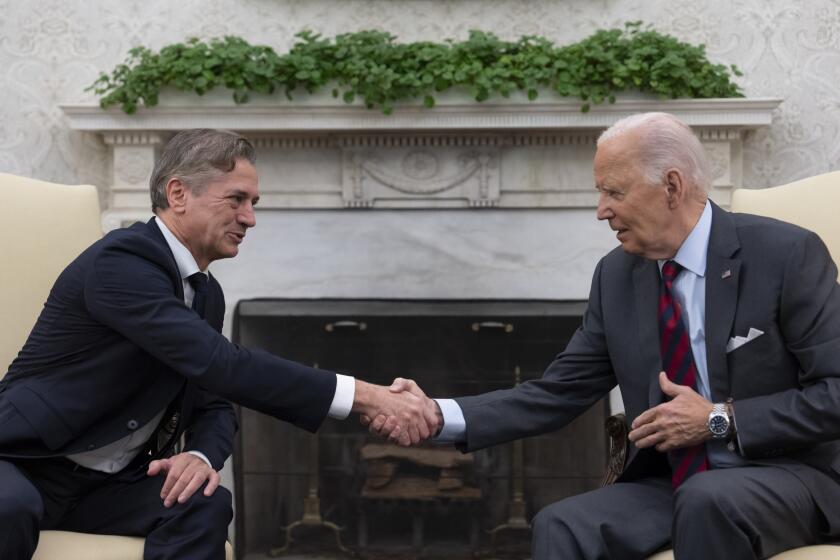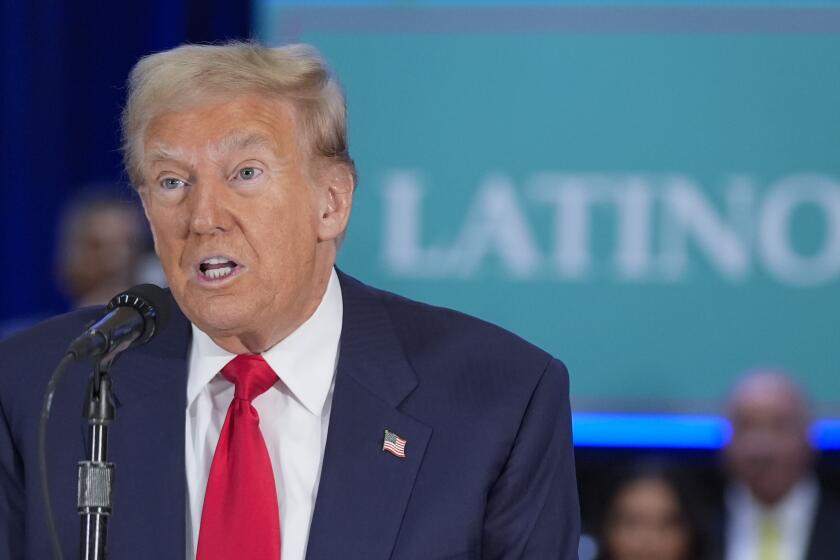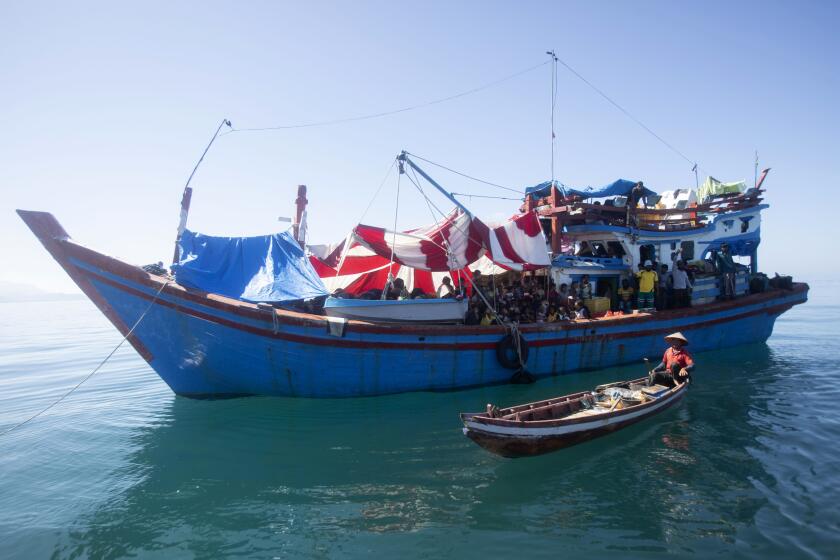Next Step : In the Mind of : AIDID : The warlord wants to be kingmaker, if not king. Peace efforts could end abruptly if he feels slighted.
Just three months before he declared war on the United States and the United Nations, a kinder and gentler Mohammed Farah Aidid sat on the rooftop of his heavily armed Mogadishu compound, idly tapping the shaft of his ceremonial warlord cane and smiling faintly at the U.S. helicopter gunships that occasionally circled overhead.
“The American presence in Somalia is very important, and it should be continued in a very constructive way,” Aidid told a Times reporter on that quiet March afternoon. “I believe it’s too soon for the Americans to leave.
“And I hope President Clinton will consider this wish of the Somali people and not abandon them. Please, the American troops are needed here for some time more.”
It wasn’t long before Aidid the diplomat gave way to Aidid the general, ordering a well-armed band of urban guerrillas to launch a bloody campaign against the very troops he had said he wanted to remain in his war-ravaged nation.
To someone familiar with the thinking of the soft-spoken warlord, the change was no surprise. In fact, even as Aidid continued to hold court on the rooftop of his compound last March, one of his key advisers offered a glimmer of what was to come.
“At the moment, Aidid wants the U.S. to stay only because he hates and distrusts the U.N. even more,” the aide said. “His grudge against (U.N.) Secretary General Boutros Boutros-Ghali is far deeper, far more longstanding and much more intensely personal. Already he feels that the Somalis have thrown their sovereignty out the window, along with their pride.
“But the moment Aidid senses the U.S. and the U.N. are one, the moment he believes they are favoring other clans over his, it will be open season even on the Americans here in Mogadishu. This is a very dangerous game to be playing, because it’s very difficult to be evenhanded in Somalia. If Aidid senses he is being pushed out, I guarantee you the results will be horrifying.”
As the Clinton Administration embarks this week on a new policy aimed at effecting an honorable American withdrawal from Somalia by next spring--and Aidid sets his own course to remake his image from hostage-taker to peacemaker--the thinking and complex personality of the 57-year-old continue to be key factors in the chances for that policy’s success.
Over the weekend, Aidid indicated he’s ready to join in a new round of peace talks aimed at a political settlement. But in the long term, will he simply choose to lay low until after the Americans leave, only to renew a violent struggle for power at that time? That, most observers believe, is a possibility, particularly if he believes that any proposed political settlement shortchanges him and his clan.
As Aidid’s adviser warned last March, the proud warlord’s actions flow directly from his perceptions of how he is being treated.
After all, in Somali, the name “Aidid” means “the one who will not be insulted.” To him, any action that disregards his status and that of his clan is not jus an insult but a threat requiring revenge. And always, that agenda includes the question of power.
“For the moment,” Aidid claimed last March, when asked if he wished to be Somalia’s next president, “I have no pretense of that.”
At the very least, though, Aidid clearly wants to be kingmaker in any Somalia that emerges from the ashes that are, in part, his own creation. It is a right, Aidid believes, that is backed by his position as the leader of one of Somalia’s largest sub-clans and as the guerrilla general who ultimately overthrew the brutal dictatorship of the U.S.-backed President Mohamed Siad Barre in January, 1991.
In fact, to an apparently growing number of supporters who see Aidid as brave, patriotic and charismatic, the attacks his men have been carrying out are justified. They are viewed as retaliation against an overwhelmingly superior international force that is deliberately trying to marginalize him while catering to his rivals and killing hundreds of civilians.
“If the U.N. had really tried to eliminate all the warlords at the same time, there would have been great (popular) support. But to eliminate one and leave the other active, they cannot accept,” said Mohammed Sahnoun, a former U.N. envoy. “That’s humiliation, which is the worst thing in the clan structure.” Sahnoun was largely successful at balancing those clan rivalries before he was fired by Boutros-Ghali last year.
For Aidid, humiliation at the hands of the United Nations and its present envoy, retired U.S. Adm. Jonathan Howe, began June 5 when he became convinced that a force of Pakistani U.N. peacekeepers were on a mission to shut down his Mogadishu radio station--”to prohibit the Somali nation from hearing any voice other than that of the U.N.”
In a series of apparently coordinated assaults, Aidid’s forces attacked the Pakistanis, leaving 24 dead, and their corpses mutiliated. For Howe, who flatly denies allegations of U.N. bias, the attack was a critical first test of the United Nations’ authority. Force had to be met with force, he said.
After a week of failed attempts at diplomacy with Aidid--attempts that Aidid personally scoffs at as meaningless gestures--Howe ordered massive U.S. air strikes on Aidid’s strongholds. He declared Aidid the United Nations’ first-ever “Most Wanted” criminal and launched an equally unprecedented, yet so far futile, manhunt for the clan leader.
“Hey, we didn’t choose to become involved or take sides against Aidid,” Howe insisted to The Times during an interview in Mogadishu in August. His attempts to negotiate with Aidid were genuine, Howe said. “He chose to attack us. . . . This is a vicious individual carrying out a vicious campaign, and I don’t think he should be appeased in any way.”
Howe also alleged, apparently based on intelligence reports, that Aidid’s plan to battle the United Nations was developed well before the June 5 incident following consultations with veteran Islamic militant organizations in Sudan. And he asserted that Aidid had been receiving outside arms, money and even personnel through an airport that his forces controlled 30 miles west of Mogadishu.
Whether true or not, those allegations are not entirely harmful from Aidid’s perspective. Once virtually anonymous outside Somalia, he is now considered a populist hero in Baghdad, Tehran, Khartoum and among other regimes that Washington has treated as world renegades.
Among his compatriots, Aidid has become even more of a national folk hero with the help of a mobile radio transmitter that the U.N. concedes it has been unable to locate and destroy for more than four months. He has also traded heavily on the the huge Somali civilian death toll in the wake of the U.N.’s hunt for him.
But even in the context of Somalia’s clan politics, where one warlord’s gain is inevitably another’s loss, this recognition hardly makes up for Aidid’s losses--a reality of the clan rivalries that help explain what triggered Aidid’s actions in the first place.
“The U.N. seems to have forgotten that Aidid isn’t just a person,” commented Ahmad Hussein Fidow, a Somali intellectual. “He represents a clan. When you push down his clan, other clans come up. And that’s what’s happening.”
In attacking Aidid’s arsenals and capturing his key aides--among them his vitally needed financial kingpin, Osman Hassan Ali, better known by his nickname Osman Atto--the United Nations simultaneously strengthened the hand of Aidid’s principal rival, Ali Mahdi Mohamed.
A key illustration involves one of Somalia’s largest industries: trade with Kenya in the natural stimulant, khat, which is a staple of Somali life. The khat trade is enormously lucrative to the clan that controls it, and that, until the United Nations shut down its airport, was Aidid’s Haber Gadir clan. Within days, the bush pilots who fly the leafy drug from Kenya switched their landing zone to the airport that Mahdi controls in north Mogadishu.
“Overnight, the U.N. shifted the balance of power within Mogadishu’s two main rival clans,” said one veteran Western aid worker in the Somali capital. “And that’s the stuff desperation is made of.”
The rivalry between Aidid and Mahdi also lies at the heart of Aidid’s distrust of Boutros-Ghali, who, in his former role as Egypt’s foreign minister, agreed to recognize Mahdi as head of a hastily formed national government after Siad Barre fled nearly three years ago. Nurturing Aidid’s current conspiracy theories is the fact that the only other nation to officially recognize Mahdi was the United States.
Under the circumstances, analysts believe the key to any future political solution in Somalia--even a short-term one that would at least permit a relatively honorable American exit from the country--is the same veteran U.S. diplomat who laid the political groundwork that protected the huge U.S. Marine force in Somalia earlier this year: former U.S. Ambassador Robert P. Oakley.
Oakley, who was sent back to the region by President Clinton last weekend to do just that, won considerable personal respect from Aidid during dozens of meetings over the four months that the United States commanded Operation Restore Hope in Somalia before turning it over to the United Nations on May 4.
Although Aidid’s radio station late last week criticized Oakley as “the originator of the current crisis between the U.N. and Somalia,” and called it “a shame for the current Administration to bring back such a person,” Aidid quickly changed the tune. He offered up a truce if Oakley and the United Nations agreed to abandon the hunt and include him in the debate about Somalia’s future.
A U.S. official said Sunday that Oakley is under instructions to avoid dealing directly with Aidid because he is still considered a “fugitive from justice,” with U.N. criminal charges against him still outstanding. But the envoy, who arrived in Mogadishu Sunday, has already held talks with other members of Aidid’s clan, thus opening at least an indirect line of communication with the renegade warlord, whose forces continue to hold at least one U.S. soldier captive.
Throughout the U.S. military intervention, Oakley proved himself masterful at balancing the clans, never favoring one clan leader over another. “He refused to set himself up as an arbiter,” said the spokesman for the U.S. operation, Marine Col. Fred Peck. “He was a mediator.”
A long-term solution, though, clearly will be more difficult.
Oakley himself conceded as he departed Mogadishu at the end of his last assignment in April that the U.S. Marine mission “was not to pacify Somalia. It wasn’t to rebuild their political system. Those are jobs that the United Nations was undertaking before and will be undertaking again soon.”
And the Clinton Administration new policy, while still not entirely clear as it affects Aidid, appears at least to affirm that rebuilding Somalia will require the cooperation of Aidid’s clan.
How Aidid feels about the fast-changing political scenario will only be made clear in time.
But back on that Mogadishu rooftop last March--a rooftop since collapsed under U.S. air strikes--Aidid made it clear he has a vision of his own. He depicted a future Somalia as a patchwork quilt of autonomous, clan-based ministates that, he insisted, must form from within, without external interference, and ultimately elect a national leadership.
“This is our job,” he said, adding that either U.S. or U.N. efforts to structure district or local governments would be “mistakes that create jealousy among the groups. This is our job. They should leave it to us.”
Fineman, now Nicosia bureau chief, has traveled to Somalia five times to cover the crisis and has interviewed Mohammed Farah Aidid twice.
More to Read
Sign up for Essential California
The most important California stories and recommendations in your inbox every morning.
You may occasionally receive promotional content from the Los Angeles Times.










